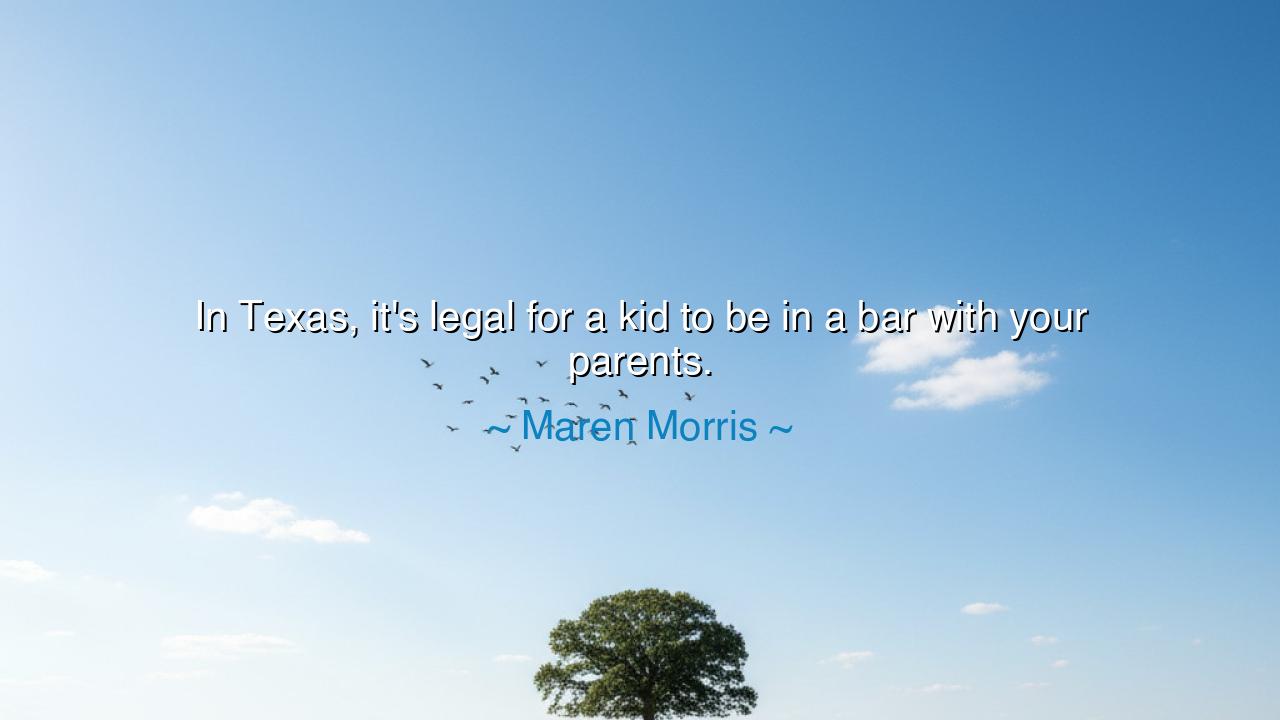
In Texas, it's legal for a kid to be in a bar with your parents.






The words of Maren Morris — “In Texas, it’s legal for a kid to be in a bar with your parents” — may seem at first like a simple observation about local law, but within them lies something deeper, something almost poetic about the nature of culture, community, and the shaping of character. It is a statement that, on its surface, reveals a quirk of Texan life, but in its spirit, it speaks to a larger truth: that laws and customs do not merely govern behavior — they reflect the soul of a people. In this case, the soul of Texas, vast and unapologetic, holds within it a blend of rugged freedom, family closeness, and a defiant trust in personal responsibility.
From ancient times to our modern age, societies have always wrestled with how much freedom to give their citizens, and how much to restrain. Some civilizations, like Sparta, built walls of discipline so thick that individuality vanished within the collective. Others, like Athens, allowed the wind of liberty to blow freely, sometimes too freely, at the risk of chaos. Texas, in its own distinct way, carries the spirit of those older worlds — a belief that freedom begins at home, and that parents, not governments, should teach their children where boundaries lie. When Maren Morris speaks of a child sitting beside their parents in a bar, she is not describing lawlessness; she is describing trust — the idea that community and upbringing can do what legislation often cannot.
Morris, a daughter of Texas herself, grew up amid that same culture — one where music and storytelling were born in taverns, dance halls, and roadside bars. To her, this law is not about rebellion but about connection. In such places, life unfolds in its rawest form: songs are sung, truths are told, and generations meet across wooden tables and neon light. The child who sits quietly at the bar is not there to drink, but to observe the rhythm of humanity — to see the laughter, the arguments, the music, the tears. This is the kind of education no school can give: the education of the heart, of empathy, of understanding life’s fullness.
In history, many great figures were formed not in formal halls but in the midst of ordinary people. Abraham Lincoln, before he became a statesman, learned the spirit of the common folk by listening in taverns and public gatherings along the American frontier. There he heard the cadences of debate, the pain of loss, the humor of survival. Similarly, in the medieval inns of Europe, poets and philosophers gathered where merchants and peasants met — because truth often hides where the rules of propriety do not reach. Thus, what Texas law permits — a child in a bar under the guidance of their parents — echoes this ancient pattern: that wisdom can be found not in isolation from the world, but in the midst of it.
There is, too, a symbolic layer to Morris’s words — a reflection of Texan identity itself. Texas has always stood for a kind of unfiltered authenticity, a defiance of overregulation, a reverence for the individual spirit. It is a land that says, “We trust our own.” In a world that increasingly fences life with policies and permissions, the Texan spirit remains rooted in the belief that freedom and responsibility must walk hand in hand. That a child learns not by being shielded from the world, but by being introduced to it with guidance and love. In such a culture, law is not an instrument of control but a framework for trust.
And yet, this freedom is not without its lessons of caution. For every society that values liberty, there must also be the wisdom to use it well. The bar, in this story, becomes a metaphor — a place where human nature reveals itself. The parent’s role, therefore, is not simply to allow the child’s presence, but to teach discernment: when to listen, when to speak, when to walk away. Freedom without teaching becomes recklessness; law without freedom becomes tyranny. The balance, delicate and ancient, lies in cultivating character through experience, not isolation.
So let this truth, hidden in Maren Morris’s simple sentence, be carried forward: that culture shapes law, and law, in turn, shapes souls. A society that trusts its people teaches them to be trustworthy. A parent who guides their child through the realities of life prepares them to face it with strength. Whether in the dusty bars of Texas or in the bustling streets of any city, the principle remains — freedom is not the absence of boundaries, but the wisdom to live rightly within them.
And thus, dear listener, remember the lesson of these words: laws may tell us what we can do, but it is the heart that decides how we do it. Let us be like those Texan parents — neither fearful nor careless, but bold enough to bring the next generation into the world as it is, and wise enough to teach them how to walk through it with grace, humility, and courage. For only then can a society truly be free — not because the law allows it, but because the people deserve it.






AAdministratorAdministrator
Welcome, honored guests. Please leave a comment, we will respond soon